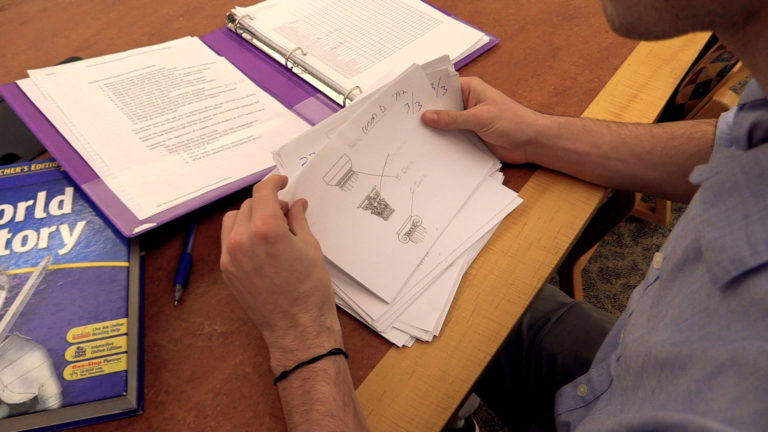Executive Editor Robin Gericke and Video Editor Matthew Pertz created the following multimedia package that shows the value of student practicums.
The Collegian Video – Practicum from Collegian Video on Vimeo.
Practicums offer unique career preparation
by Robin Gericke, Executive Editor and Matthew Pertz, News Editor
Three majors at Asbury University offer students a rigorous and valuable experience: practicums. The psychology, social work and education departments offer practicums as a way for students to get hours in their career fields in order to shape their calling and give them experience that will benefit them when applying for jobs. Juniors Drew Cooney and Blake Helton, along with senior Alyssa Martin, are completing practicums this semester.
Cooney, a secondary education major, is currently ‘on block’ at West Jessamine Middle School. The major requires three ‘blocks’ of observation, participation and teaching hours before ending with a semester of student teaching. The first block requires 60 hours, and the second and third blocks each require 75 hours.
Helton is completing a 200 hour practicum at Providence School, an alternative middle and high school in Wilmore. Helton’s perspective is different than Cooney’s because, as a social work major, Helton’s focus is not on teaching, but on handling issues that arise with the students. “I am with one of the guidance counselors who is a social worker,” he said. “There’s two social workers there, and they serve as counselor[s] for a variety of needs for students. They help with scheduling and conflict outside of school and they also provide therapeutic counseling.”
Martin is a psychology major completing her practicum at the UK Speech Clinic. The major offers three practicums: clinical, research and teaching. Martin is completing her clinical this semester and worked on her research practicum last semester.
Cooney’s first block was at Dunbar High School during his freshman year. He is currently in his second block. “During the semester, I teach five lessons on my own, get observation hours and ‘co-teach,’ which is basically helping the teacher with lessons,” Cooney explained.
This rigorous of a practicum is not common among education programs. “Most universities just send you right into student teaching, which is the end of our program here,” Cooney said. “But then, in your senior year, you might realize that you actually don’t like teaching.”
Discovering if teaching is the right career path is only one of the benefits of the practicum. For education, lectures and homework aren’t the sole preparations needed to go into the teaching field. “There are some things, especially in education, that you can only learn by being in the classroom,” Cooney said.
Completing a practicum has also affirmed Helton’s calling to social work. “This is definitely the field that I want to be in. I like working in more high stress situations because you’re not doing the same thing every day. It’s new every time,” Helton said. “You might not be prepared but you’re going to go for it.”
Cooney hopes that the practicum Asbury requires will make him stand out when he applies for a job. “This is an advantage going into my career because I’ve had a ton of experience in the classroom. I’ve networked with principals, teachers and other staff members at schools, and I’ve gained general classroom experiences that will help me in my own classroom.”
Martin also found value in the networking she does at her practicum. “I believe that practicums will be an advantage because as I apply for grad schools, they will be on my transcript and resumes. It will show my network experience as well because I’m working with lots of people in the field and they’re getting to know me and my work ethic and career goals. I have those people as resources when I am applying for jobs or grad schools.” This will help her for future jobs, even if it’s not at UK.
Each student returns from their practicum with stories of challenges, victories and valuable moments. In the first few weeks of his block, Cooney taught a lesson about Greek architecture, and a week later, the class was watching a film. “One of my favorite memories of this block was when some of the kids pointed out Greek architecture in the movie based on my lesson,” Cooney said.
Martin passionately shows her dedication to the research she is still conducting for her research clinical. The statistics that came back from months of research were shocking, and showed that our image of God, shame and mental health were more impactful than originally thought. However, she also addressed the challenge of psychology research. While researchers are the one to find problems and issues, they are not often the ones who carry out plans to fix those problems, if even a solution is applied at all.
Helton is confident in the importance of the work he is doing. “These kids don’t typically have a voice in their homes or in the regular school systems or if they’re in the court system, but they’re able to voice it at Providence,” he said. “Even if it’s not the greatest, we’re still able to be there for them and listen to them.”
Each of these students is receiving invaluable experience through practicums and knows that, though challenging, these experiences are shaping their calling and providing them with more opportunities in the future.
Photo by Robin Gericke




